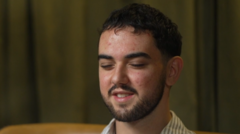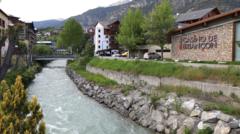Calum Macdonald, now blind from methanol poisoning, shares his experience as he and the families of other victims advocate for increased awareness and government action regarding the risks of methanol in drinks, particularly in Southeast Asia.
Tourist Survivors Speak Out on Methanol Poisoning Crisis in Southeast Asia

Tourist Survivors Speak Out on Methanol Poisoning Crisis in Southeast Asia
Following a string of fatal methanol poisonings in Laos, survivors and victims’ families urge caution and greater awareness of the dangers associated with contaminated alcohol.
When 23-year-old Calum Macdonald arrived at the Vietnamese border after a trip to Laos, he was greeted by a shocking reality: a “kaleidoscopic blinding light” clouded his vision. Just the day before, he and his friends had participated in the free shots offered at a hostel in Vang Vieng, blissfully unaware of the peril that awaited them. As they traveled on from Laos, it became apparent that Calum's condition was far graver than merely food poisoning; he was losing his sight.
Calum is one of several victims of a concerning trend of methanol poisoning that swept through the popular tourist destination, culminating in six fatalities last November. The young traveler had met two of the deceased—Danish tourists—during an outing at Nana Backpacker Hostel, and now he stands united with the families of three other British victims seeking accountability and enhanced safety measures for future travelers.
Among them is Simone White, who, after enjoying free shots like Calum, fell terminally ill. Before losing consciousness, Simone texted her mother about the amazing holiday she was having, unaware of the imminent danger. Her mother, Sue, rushed to Laos upon learning of her daughter’s condition, but tragically, Simone succumbed to the poison shortly before her arrival. “Nothing is going to bring Simone back,” Sue reflects, mourning a trip that had turned into a nightmare.
Methanol, a toxic alcohol often found in cleaning products and antifreeze, can inadvertently contaminate poorly produced alcoholic drinks. This issue predominantly escapes notice among tourists who mistake the initial symptoms of methanol poisoning for a regular hangover. Dr. Without Borders has noted hundreds of poisonings in Southeast Asia each year, where cheap spirits are a common offering.
Further harrowing accounts have emerged, such as that of Kirsty McKie, who perished after consuming contaminated alcohol in Bali, and Cheznye Emmons, whose tragic demise was linked to gin that contained exceptionally high levels of methanol. In speaking about their losses, survivors emphasize the psychological impact and urge fellow travelers to rethink their approach to free alcohol and drinks ordered in unfamiliar locales.
Calum advises caution, "There are many delightful beers in Southeast Asia—stick with those!” He acknowledges the privilege of surviving while many others faced far worse outcomes. Now navigating his new reality as a blind man, he is committed to warning others about the perils of methanol poisoning and advocating for improved public awareness.
The Foreign Office has classified methanol poisoning as a significant concern for travelers, indicating ongoing collaboration with local authorities and the travel industry to manage and communicate potential risks. In the wake of these tragedies, families and survivors like Calum are determined to ensure that others do not share the same fate.
















